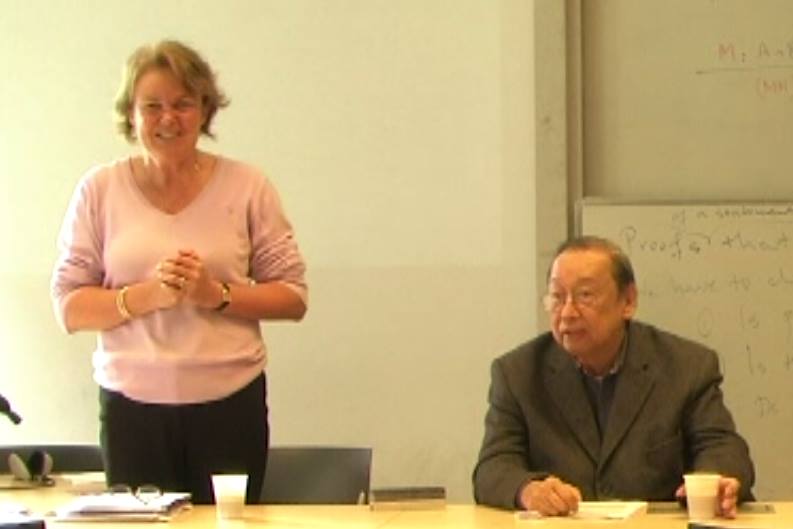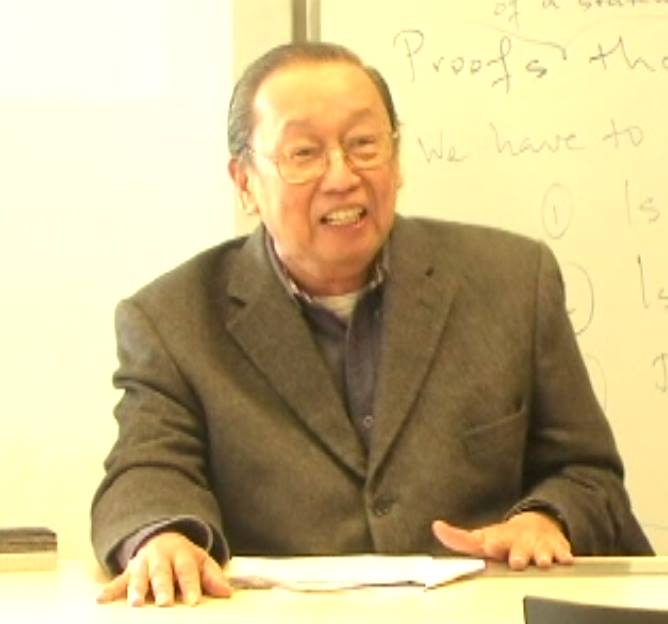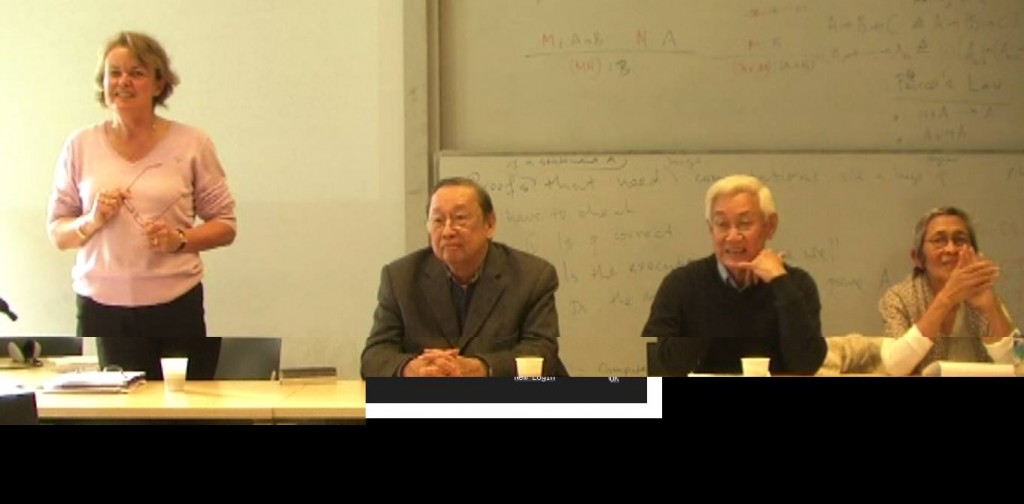Read at the International Development Studies at the Utrecht University,
17 November 2014
By Prof. Jose Maria Sison
Founding Chairman, Communist Party of the Philippines
Chief Political Consultant, NDFP Negotiating Panel
I thank Prof. Robert Fletcher and the International Development Studies Program for the invitation to speak on the role of activism in relation to development issues in the Philippines.
Let me try to you give a brief introduction on the basic problems of economic underdevelopment in the Philippines and the program of action for economic development being proposed and demanded by three types of activism associated with the legal national democratic movement, the people’s democratic revolution and the movement for a just and lasting peace.
Mr. Luis Jalandoni, Chief International Representative and Chairperson of the Panel of the National Democratic Front of the Philippines (NDFP) Negotiating with the Panel of the Government of the Philippines (GPH), will speak on the minimum and maximum programs of land reform in relation to the people’s democratic revolution which integrates armed struggle, land reform and mass base building.
Ms. Julieta de Lima, Chairperson of the NDFP Committee on Social and Economic Reforms negotiating with its counterpart in the GPH-NDFP peace negotiations, will speak on economic sovereignty, genuine land reform, national industrialization and social justice being demanded by the peace movement and the people.
The Philippines is an archipelagic country east of the Asian mainland, north of Indonesia and south of Japan. It has a population of more than 100 million and a workforce of 59 million. It has rich natural resources, including 14 out of the 16 mineral ores necessary for industrial development. But the Filipino people are poor consigned to an underdeveloped, agrarian, pre-industrial and semifeudal economy, despite the abundance of Filipino professionals, scientists, technologists and skilled workers. More than 10 per cent of the population or more than 20 per cent of the workforce have to look for work abroad and are in more than 120 countries.
The Philipines has a current GDP of USD 272 billion. The GDP per capita of USD 2790 puts the Philippines at the 126th spot. Because of the inflow of hot money or portfolio investments, there was a rise of the GDP by 6.8 per cent in 2012 and 7.2 per cent in 2013. This has led the mulilateral agencies, hedge funds and the business journalists to hype the Philippines aa a newly-industrialized countrty, an emergent market or a tiger cub economy. The false illusion of industrialization is conjured by teaming up the output values of the service and industry sectors at 54.4 per cent and 33 per cent respectively against that of agriculture at 12.3 per cent and the work force distribution of 52 per cent and 15 per cent in the service and industry sectors against 33 per cent in agriculture. But the service and industry sectors are heavily dependent on foreign debt and imported equipment and fuel, add low values and are consumption-oriented.
Let me give you a bit of history. The Filipino people underwent more than three centuries of Spanish colonial rule and became the first Asian people to overthrow a Western colonial power in 1898. But the US launched an imperialist war of aggression in 1899 and imposed colonial rule on the Philippines. Despite the nominal grant of independence in 1946, the US continues to dominate the Philippines as a semicolony (if you wish to stress political control) or as a neocolony (if you wish to stress the economic and financial control). The domination is done through unequal treaties, agreements and arrangements in the political, economic, financial, security and other spheres.
Let me give you a view of the social structure. The ruling classes in the Philippines are the comprador big bourgeoisie based in the big cities and the landlord class based in the expanse of the countryside. They are the main exploiting classes and are merely 1 per cent of the population. The intermediate social strata are middle bourgeoisie and urban petty bourgeoisie which are 1 and 7 percent of the population, respectively. The basic exploited classes are the working class and the peasantry, which are 16 and 75 per cent, respectively.
The high officials of the Philippines are essentially political representatives of the aforesaid ruling classes. They do compete as factional groups in periodic elections but they are bound to adopt and implement social and economic policies that harmonize the interests of the US and multilateral agencies and the local exploiting classes. They have been called the bureaucrat capitalists serving as brokers between the foreign monopoly capitalism and domestic feudalism. Whether they take the form of autocracy or an oligarchy, these bureaucrat capitalists equally oppress and exploit the people.
Under the auspices of neocolonialism, we have some industries dependent on imported equipment and fuel. We have undertaken reassembly and repacking enterprises, token land reform and graft-ridden infrastructure building since the 1950s. We have gone through the First UN Development Decade of the 1960s and the Second Development Decade of the 1970s, with the IMF looking after the financial subordination of the Philippines to the US and other developed countries and the World Bank financing graft-ridden infrastructure programs and projects to facilitate the traditional exchange of raw material exports and manufactured imports. The UN development decades coincided with the Marcos fascist dictatorship prolonging the import-substitution assembly plants and eventually paving the way for the reexport-oriented semimamufacturing enterprises in export-processing zones.
The basic problems of foreign monopoly capitalism, domestic feudalism and bureaucrat capitalism have persisted. These have been aggravated under the auspices of neoliberalism which has resulted in increased investment privileges for multinational firms and banks, privatization of public assets, deregulation and denationalization of the economy. Under the neoliberal policy dictated by the US to the postMarcos regimes, the WTO has drawn the Philippines to “free trade” agreements at the global and regional levels, multilaterally and bilaterally. The Philippines to some extent has been one of those underdeveloped countries favored at times with money and credit flows for private construction booms and reexport-oriented semimanufacturing of semiconductors and basic consumer goods like garments, footwear and subsequently hard hit by the global financial and economic crisis.
The Philippines is chronically beset by foreign trade deficits and mounting foreign debt because of the unequal exchange of imported manufactures on one hand and the exported raw materials and semimanufactures on the other hand. The construction of high rise buildings, the accelerated export of mineral and plantation crops and the remittances of overseas contract workers have not resulted in industrial development but in further underdevelopment. Budgetary deficits have also grown because of economic stagnation and wastage of public funds in bureaucratic corruption and military expenditures.
The underdeveloped Philippine economy is in a chronic state of crisis. This is well manifested by widespread poverty, high rates of unemployment, landlessness, ever decreasing levels of income, soaring prices of basic goods and services, grossly inadequate social services (in education, health, housing, poverty alleviation, disaster relief and so on) and the ever deteriorating infrastructure. The dire economic and social conditions, the exploitativeness and repressiveness of the ruling system have made the Philippines a fertile ground for social activism.
In 1958 when I was a graduate student and teaching fellow at the University of the Philippines, I was among the students who wrote patriotic and progressive articles and formed a student organization to demand full national independence and democracy, social justice, economic development through land reform and national industrialization, a patriotic and progressive culture and international solidarity with peoples fighting against imperialism and reaction. We succeeded in reviving anti-imperialist and anti-feudal protest actions and generating a significant national democratic movement among students nationwide by 1961.
We proceeded to bring our political and organizational work to the toiling masses of workers and peasants. In 1962 we joined the research and education department of the Workers’ Party and we conducted seminars among the trade unions. We were also able to establish connections with peasant associations and provided them with refresher courses on land reform and the national democratic movement. By 1964 we were able to establish the Patriotic Youth, a comprehensive organization of students and young workers, peasants, teachers and other professionals.
By 1966 we formed a united front organization for workers, peasants, youth, women, professionals, patriotic businessmen, bourgeois national members of Congress and progressive religious. We were able to hold mass actions with as many 25,000 participants. We consistently demanded the abrogation of unequal treaties, agreements and arrangements with the US, especially in the economic and military spheres, and the adoption of policies for land reform and industrialization. We joined the workers in their strikes against particular employers and against government policies. We also joined the peasants in demanding genuine land reform.
Our demands were not heeded by those in power, although we were allowed extremely limited time to express our views in public congressional hearings and in the bourgeois mass media. By 1968 we were confronted by increasingly repressive measures. We raised the level of our activism from entirely legal forms of struggle to revolutionary armed struggle without giving up or opposing the patriotic and progressive forces that carry out legal struggle, including electoral struggle and struggle in court against human rights violations in the political, civil, economic, social and cultural fields.
We reestablished the Communist Party of the Philippines (CPP) and we issued the Program for a People’s Democratic Revolution. We have consistently called for economic sovereignty, social justice and economic development through land reform and national industrialization. We have considered land reform as the main content of the democratic revolution because it spells the economic, social and political liberation of the peasant majority of the people. We stressed the complementary relationship of land reform and national industrialization. The open secret about the CPP being able to wage a protracted people’s war is the persistence of gross exploitation and rampant poverty and the success of the CPP and the peasant movement in carrying out agrarian revolution in stages.
The Communist Party of the Philippines, the New People’s Army, the mass organizations and the local organs of political power grew in strength as fascist dictatorship was imposed by Marcos on the people from 1972 to 1986. As soon as Marcos fell, the revolutionary forces were ready to negotiate peace with those who came to power. But the worst reactionaries have so far succeeded in fouling up the possibility of peace by being far more interested in the capitulation and pacification of the revolutionary than in addressing the roots of the civil war with agreements on social, economic and political reforms.
Even then, the NDFP as representative of the revolutionary forces and people is ever ready to resume formal talks in peace negotiations. It appreciates the rise of one more form of activism undertaken by peace advocates and people from various classes and sectors who demand that the Manila government and the NDFP pursue the peace negotiations seriously in accordance with The Hague Joint Declaration of 1992 and succeeding agreements. The peace movement reflects the clamor of the people for social, economic and political reforms as the basis of a just and lasting peace.
As the social and economic crisis is worsening in the Philippines, it is urgent to resume the negotiations on social and economic reforms. The NDFP has submitted its 50-page draft of the Comprehensive Agreement on Social and Economic Reforms since a long time ago. Development issues are addressed in this draft. They refer to the problems of foreign economic domination, persistence of feudal and semi-feudal exploitation and bureaucratic corruption.
The solutions are spelled out, such as upholding economic sovereignty, conservation of the national patrimony, wise utilization of natural resources, land reform, national industrialization, immediate provision of livelihood and employment and expansion of social services. The NDFP continues to hope that said solutions can be realized by the combined strength and cooperation of the now conflicting forces.
Thank you. ###


